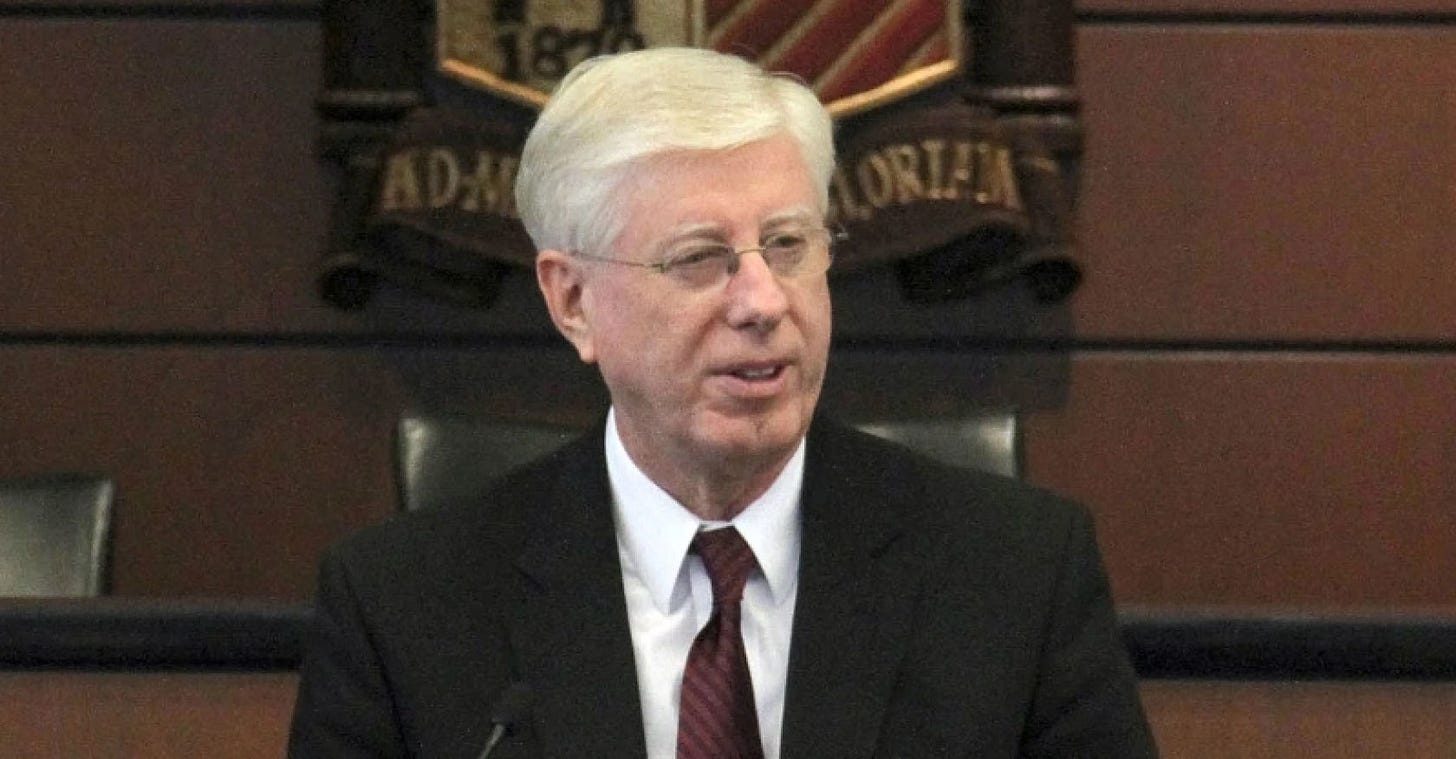Attorneys general used to be on the front lines of consumer protection. Where did they go?
They're not around when you need them anymore
Former Iowa Attorney General Tom J. Miller. (Patrickryanzero/Wikimedia Commons)
Attorneys general have never quite been household names but their influence has often exceeded their notoriety. They’re the aspiring governors who are basically the chief lawyer for each state and, of course, the poor old District of Columbia. The job is widely regarded as a prime stepping stone to the governor’s mansion. You get your name in the paper a lot and can be seen as a fearless defender of consumers, whether you really are or not.
In the past, people like Kamala Harris and Beau Biden made a pretty good name for themselves, suing crooked car dealers and loan sharks and proclaiming themselves the “chief law enforcement officer” of their states. Most crimes are prosecuted locally but that’s a detail that gets glossed over.
Most of the true champions of the huddled masses were in bluish states, of course, but even those of a reddish hue often stepped forward to take on a state’s evildoers.
The lawsuits are still flying today but the AGs are more likely to be suing each other and the federal government over the social issues that today substitute for reasoned political commentary. Coupled with the Trumpian decimation of the federal consumer-protection agencies, this leaves consumers fair game for shysters of all varieties while the attorneys general crusade on behalf of or in opposition to such things as abortion, transsexual sports and electric cars.
Messin’ with Texas
Probably no one is better at this than Kan Paxton, the Texas AG who studied under the master of quasi-legal snowmanship Greg Abbott, who has achieved the dream of ascending to the governor’s office. It’s sometimes difficult to decode Paxton’s broadsides, trumpeted daily in news releases with titles like “Attorney General Ken Paxton Stops Biden’s ’Pronoun Police’ Rule Attempting to Force Businesses to Adopt Toxic ’Transgender’ Workplace Policies.”
The Biden administration which, last we heard, is out office, frequently gets pilloried, as in “Attorney General Ken Paxton Takes Action Against General Mills as Part of Investigation into the Company for Violations of Texas Law.” If you’re wondering, the gross outrage here was General Mills’ stooping to describe some of its food as “healthy” when everyone knows that a bowl of corn flakes is the first step on the road to the crematory.
Paxton goes easy, though, when a true injustice is found, as in the case of an insurance company he wrongly vilified for allegedly shadowing journalists, lawmakers and just plain folks. As can happen when you sue first, ask questions later, Paxton had to eat his words in this release (note the convenient omission of his name in the headline): “Texas Office of the Attorney General Closes Investigation into Insurance Company After Determining No Violations Occurred.”
New York and California AGs mirror Paxton’s frenetic pace, though with a bit more substance and a different set of targets. New York’s Letitia James does her political duty with suits challenging the Trump cut-off of US AID funding while also wringing billions out of Purdue Pharma and the Sackler family for their roles in the opioid crisis.
No crime? Find one!
But missing is the torrent of consumer-centered legal actions that typified the office under Eliot Spitzer, who also graduated to the governor’s chair only to be unseated by an unseemly sex scandal. Spitzer mercilessly, almost gleefully, brought down titans of Wall Street and the insurance and entertainment industries, winning billions in damages for everything from market timing to “excessive compensation.” Critics said he invented new crimes if he couldn’t find violations of existing ones but, whatever his tactics, there was no doubt that he was on the prowl, tracking the biggest and juiciest targets he could find.
Americans, of course, have an odd attitude about corruption. They’re agin’ it except when they think that they themselves might someday become the CEO of some globe-girdling colossus while simultaneously harboring an abiding hatred for big shots who parade around with people who might someday become transsexuals. This makes it a little hard for would-be champions of the people (and future governors) to know whether they’ll get more points prosecuting previous presidential policies or going after consumer rip-off artists.
Here’s an unpleasant truth: a lot of consumer protection is kind of small-time stuff that nobody gets very excited about – you know, going after payday lenders, gold IRA peddlers, “wellness” promoters and other bottom-feeders whose victims are so desperate and clueless they’re grateful to their victimizers. Criticize Gwyneth at your peril.
A legend from Iowa
So what’s a perfect attorney general? It’s someone who is laser-focused on protecting everyday consumers from being mercilessly ripped off and endangered by scam artists, medicine-show barkers and quick-buck artists. It’s sort of like being a traffic cop instead of an FBI “special agent” (they’re all “special,” y’know).
There is, of course, no such thing as perfection but one who comes close would be Iowa’s Tom Miller, who held the office for ten terms, starting in the 1970s. Miller became a legend and set a standard other AGs aspired to but seldom achieved. His first big case came when he sued General Motors for overhyping an Oldsmobile engine. He went on to play a key role in a $246 billion case against the tobacco industry that resulted in a 25 percent reduction in U.S. cigarette consumption.
Until fairly recently, AGs mostly aimed their firepower at shady business practices but the growth of hyper-partisan politics has turned them into virtual hired guns who, like Paxton, pursue social-issue prosecutions that may sound good to their political base but don’t really do much for harried consumers trying to stay housed, fed and out of debt.
California AG Rob Bonta largely follows this practice, now that he holds the office Kamala Harris insisted on describing as “the nation’s second largest Justice Department.” His office daily churns out such grabbers as “Attorney General Bonta Secures Decision Blocking Trump’s Unlawful Elections Order,” and “California Will Not Waver in Defending Itself from Federal Overreach: Attorney General Bonta Sues Trump Administration for Attack on California’s Clean Vehicles Program.”
These actions are noble indeed and probably necessary but they don’t do much to contain the spread of such rampant curses as 30% interest rates, selling and reselling of private consumer information and car engines that sludge up before their time. Arguing about splinter issues is fine but somebody needs to lock the doors at night and catch those school-zone speeders.
The partisan split among the nation’s AGs has another, perhaps farther reaching, effect: it hampers the coalition-building that made states successful in bringing down big corporations. AGs from red and blue states routinely banded together to go after tobacco, GM and other over-capitalized, over-lawyered businesses.
“We accomplished enormous good for our citizens,” Tom Miller said in a recent interview with Governing, referring to the tobacco case. The most significant was probably the number of lives at stake. That made it very significant.
“And, up to that point, there was an invincibility to the tobacco industry — they never paid a dime in settlement or judgment before our case. There were billions of dollars at stake,” Miller said.
It would be nice to hear a little more language like that from today’s AGs, wouldn’t it?



